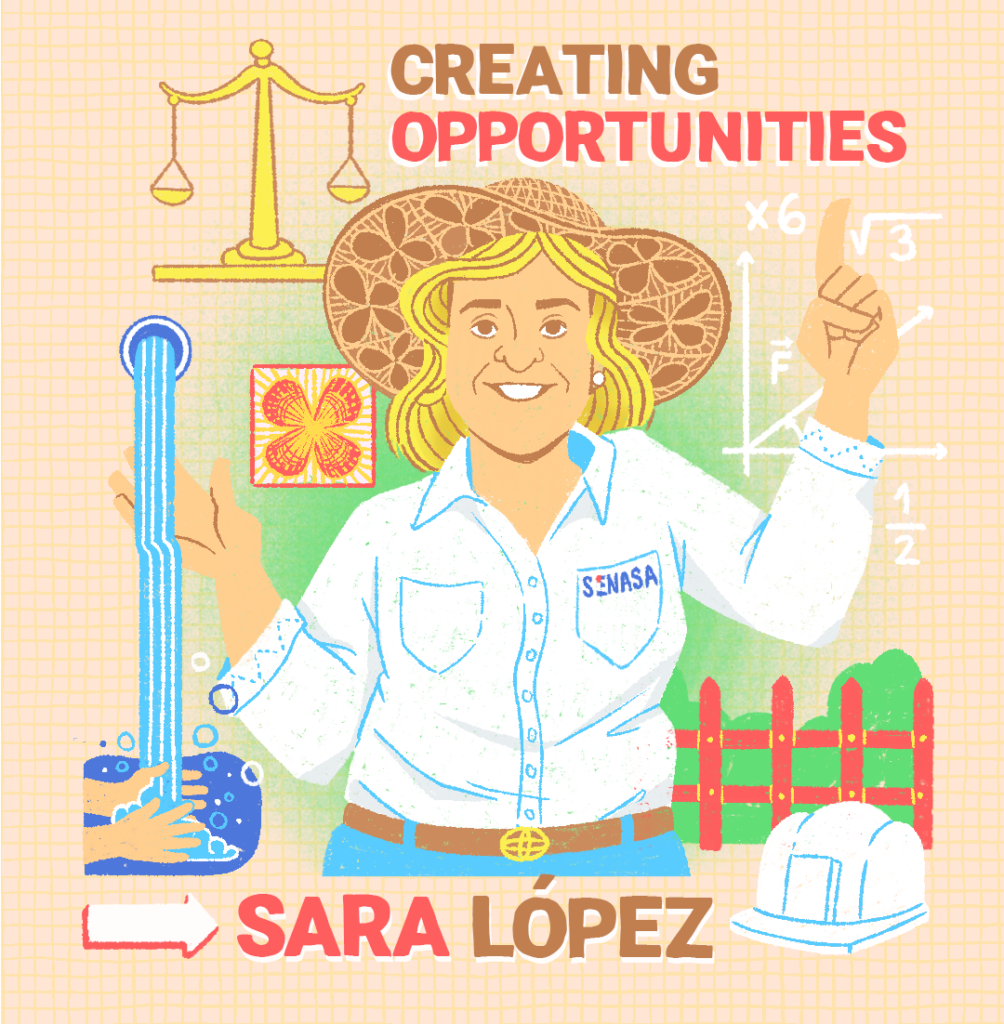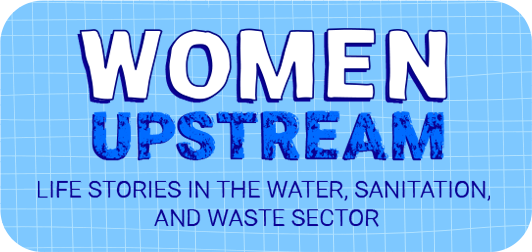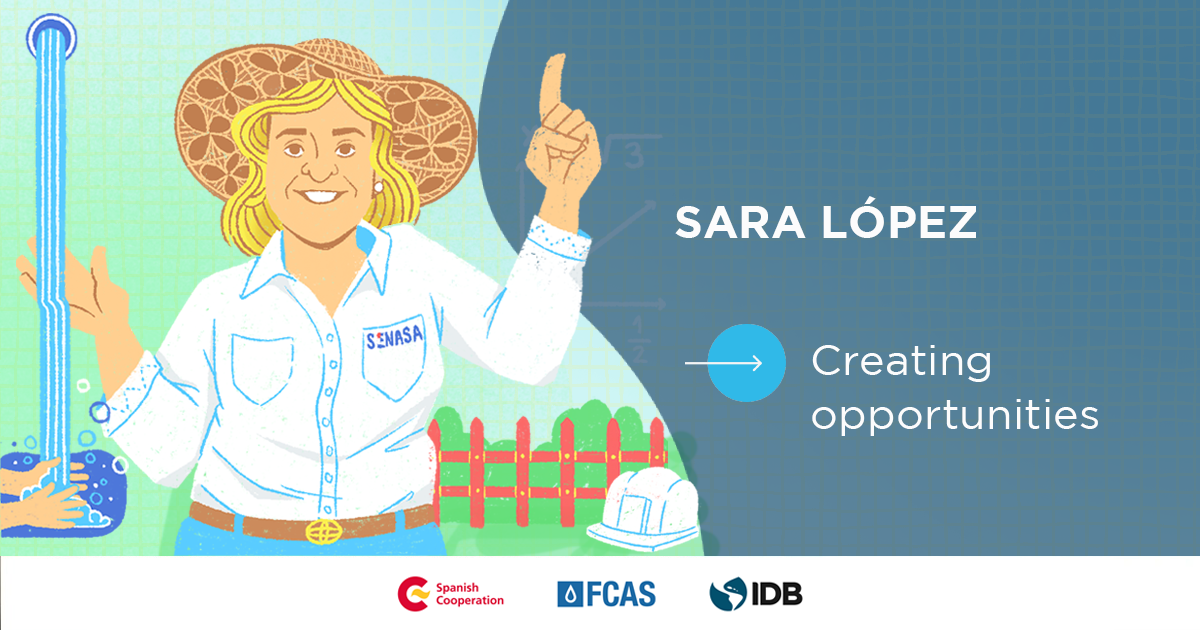Seeking to make water more accessible, Sara started as the only female engineer in water infrastructure projects. Today, she holds the highest position in the company and works to maintain a community model and increase women’s participation in the sector.
Written by Andrea Ortega C.
Sara was born in Asunción, the capital of Paraguay, to her parents and sister. Although water is more accessible in urban than rural areas, one thing that marked her childhood was the well dug between her and her maternal grandmother’s houses. She can still remember how they used a pulley to draw water with buckets from the well.
Sara liked math and science and she dreamed of becoming a doctor. However, at an early age, she understood that many careers are gendered and being a woman could limit her options, since she had to think of her home and potential children first. “My mom didn’t want me to be a doctor. She said that female doctors leave home a lot because they have a lot of commitments, so she didn’t support me,” she recalls.
In search of options that her family would support, she selected engineering and learned to make her way in highly masculinized environments. At the Catholic University of Paraguay, she was one of only 10 women engineers in a class with more than 60 men. However, she was not discouraged and began to look for job opportunities that would allow her to work in infrastructure with a social focus.
Water: A sector for social inclusion
After graduating, Sara joined the National Environmental Sanitation Service (SENASA). She started to spend more time in the field and was able to learn about the water and sanitation conditions in rural Paraguay. She mastered Guarani, a native language used by 60% of population, to get to know the communities better. “That’s when I started to love this sector,” she says.
When Sara started working, she was the only woman on the engineering team. “I was a novelty,” she says. Despite this, she never experienced or perceived any discrimination because of her gender. “I never felt rejected, they even helped me and we learned together. Maybe for some people in higher positions there was some resistance, but they accepted me anyway and I was always encouraged to take courses,” she explains. Sara was even selected among all the engineers to go to Japan for training, where she met a fellow countryman who would end up becoming her husband.
At SENASA, Sara demonstrated her capabilities, worked her way up as the only female engineer and rose through the ranks quickly. Today, she is the general director of SENASA and the second woman to hold this position in the organization’s 50-year history, where of the 10 of the 12 previous directors have been men.
Sara is aware of the difficulties that hinder gender equity in this sector. “Women are as – or often more – competent than men and we [are] committed, dedicated and passionate about what we do. I believe that to reach a position like the one I have today, it’s a question of opportunity”, she explains.
Water boards: the key to equitable access
During her career at SENASA, one of the projects that most marked Sara was the one carried out with Lazos de Agua and financed by the Water Fund of the Inter-American Development Bank (IDB) and the Spanish Agency of International Cooperation for Development (AECID). The project improved the community model for water management and trained women and young people in tariff management, handwashing and proper household water management.
Paraguay is recognized for having the most equitable water distribution in the world; 60% of the country’s water is managed through community organizations. Sara believes that the key to improving water access and management in the rural sector is to strengthen the community model. Yet she acknowledges that we still need effort to increase its quality and guarantee universal access. “I [wish for] a strengthened water sector, for the communities to have a good service, quality, quantity and continuity, under solid institutions, with organized resources and, above all, for the distribution of water to remain equitable,” she explains.

For Sara, access to water has an undeniable gender component, which is why she focuses on access in rural areas to improve the lives of women and girls. “Helping women stop being slaves to carrying water is too important an achievement, especially in the toilet infrastructure; it changes everyone’s life,” she says.
But her goals do not stop there; she hopes that the water sector will provide as many opportunities for rural women as she has had throughout her career. Sara wants to increase the participation of women in steering committees and leadership positions. In addition, she wants to create water and sanitation-related programs that will allow more women to develop skills, such as plumbing, electricity and water quality management, in order to have access to more job opportunities.
Although she sees great challenges ahead, Sara is convinced that water development with a gender perspective is the key to improving lives in rural Paraguay. “We have to understand that working with water and sanitation is not mere construction [or] infrastructure. It is working with the community and [in particular] with women. It is building citizenship and it is changing lives,” she says.
View spanish version video

Series: Upstream Women
Follow each story to learn more about the lives of women who have worked for the benefit of their community with tenacity and perseverance by taking leadership in spaces that used to be only for men.
This communication project is developed by the IDB together with AECID, which have the common goal of providing quality water and sanitation services in rural areas of the region. Learn more about the projects executed so far with the Cooperation Fund for Water and Sanitation FCAS in this publication.
Every two weeks we will upload a new profile of “Women Upstream”.
To learn more about “Women Upstream” subscribe to our blog here.
Upstream Women’s Team:
Coordination: Anamaría Núñez, María Augusta Olmedo and Leticia Ortega
IDB Gender Specialists: Naiara Martínez
Content: Andrea Ortega Carreño and Paul Constance
Illustration: Verónica Alvarado and Carolina Curbelo
Audiovisual Production: Adriana Loeff


Leave a Reply